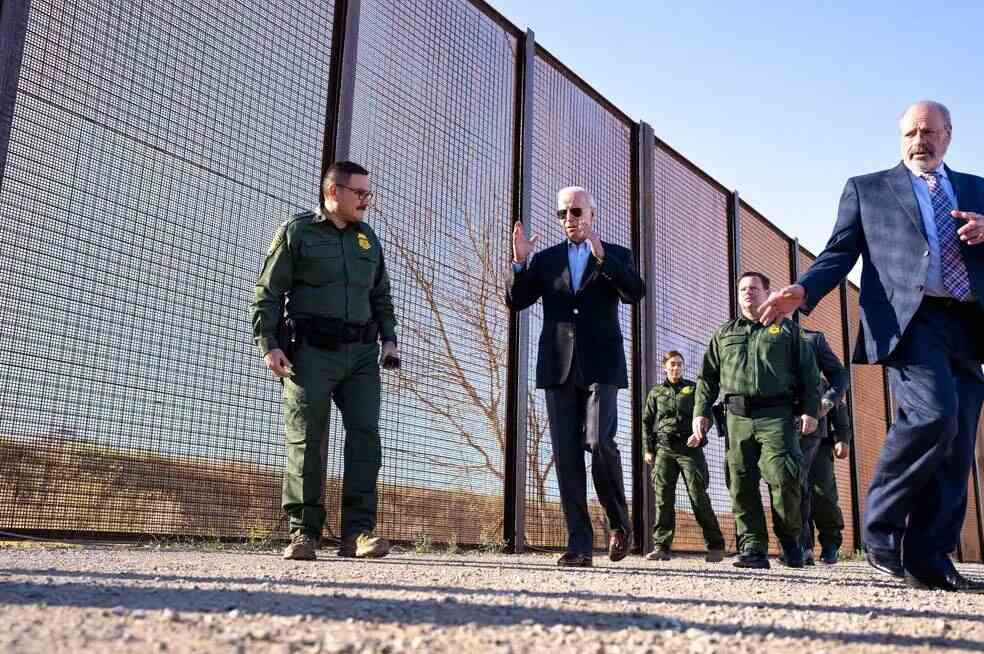President Biden defended his management of the border on Tuesday and complimented his Mexican counterpart for accepting asylum applicants rejected by the United States amid “the biggest exodus in human history” across the area.
In comments at the conclusion of a two-day meeting with the leaders of Mexico and Canada, Mr. Biden disregarded the criticism of Republicans, Democrats, and humanitarian organisations, referring to them as “extremes” and stating that he was seeking a middle ground in his approach to immigration.
“I want to applaud the president of Mexico for agreeing to take up to 3,000 people back,” Mr. Biden added, presumably alluding to the statement made last week that Mexico would receive 30,000 illegal immigrants each month from Venezuela, Haiti, Nicaragua, and Cuba.
Democrats and human rights organisations have decried the enhanced enforcement at the border as a harsh denial of asylum rights. However, Mr. Biden said on Tuesday that this effort was counterbalanced by the development of new legal immigration programmes for citizens from these nations.
In today’s linked society, there can no longer be any doubt, none. Mr. Biden said, “We cannot isolate ourselves from common concerns,” adding, “We’re trying to make it simpler for people to come here.”
Following many hours of closed-door conversations with Mexican President Andrés Manuel López Obrador and Canadian Prime Minister Justin Trudeau that also touched on the climate problem, drug trafficking, economic prosperity, and trade, the president made his remarks.
The three men agreed that the summit highlighted the collaboration between their respective administrations and downplayed long-standing differences and difficulties, particularly about economic competitiveness in the energy sector and future technologies such as electric cars.
But if the purpose of the summit was to demonstrate a common commitment to tackle immigration, it also demonstrated the intractable nature of the problem. Much of the private conversation and public statement to the media focused on how to tackle the waves of people leaving their homes in Central and South America. However, the White House fact sheet citing “important deliverables” from the summit did not contain any new big migration efforts.
At the press conference after the meeting, Mr. López Obrador provided a detailed history of the changes in migration patterns over the previous few decades and highlighted that the best approach to prevent people from leaving their homes was to invest in making their nations rich and secure.
He applauded Mr. Biden for what he saw to be an acknowledgment of this fact, while condemning previous American presidents for concentrating excessively on preventing migrants from entering the nation.
The Mexican president also took a veiled shot at Greg Abbott, the Republican governor of Texas, who last month bused a group of migrants to Washington and dumped them in front of the Naval Observatory, where Vice President Kamala Harris resides.
On the subject of climate change, White House officials said that the three world leaders had agreed to additional goals, including a vow to cut methane emissions from the solid waste and wastewater industry by at least 15 percent by 2030 compared to 2020 levels. White House officials said that they would design a strategy to reduce food waste and a separate plan to coordinate electric car charging stations along their borders.
The dynamics of the relationship between Canada and Mexico are distinct from their connections with the United States, with whom they share a common border.
In recent years, Canada has boosted its investments in Mexico, while also joining the United States in denouncing Mexico’s energy policy as a breach of the United States-Mexico-Canada Agreement, which entered into force in July 2020. However, according to analysts, Canada has little power over Mexico under the government of Mr. López Obrador.
Mr. López Obrador, unlike some of his predecessors, particularly former President Vicente Fox, has showed little interest in establishing connections with Canada, according to Mr. Bothwell. He said that the beliefs of the Mexican president stood in stark contrast to Mr. Trudeau’s longtime focus on diversity, equality, and feminism.
A trade pact that has brought the economies of Canada, the United States, and Mexico closer together will face a key test this week, as a panel of experts is anticipated to determine that the United States has breached the accord’s regulations for automobile production.
The forthcoming ruling on one of a number of notable North American trade disputes comes as the leaders reiterate their commitment to expanding commerce between their economies and preserving the rules of the United States-Mexico-Canada Agreement.
Their trade partners blame all three nations for breaking numerous provisions of the North American Free Trade Agreement, or NAFTA, which this treaty modernised and updated. The United States and Canada continue to dispute Canada’s method for controlling its dairy business, while Mexico has been criticised for its energy policies and proposal to limit imports of genetically modified maize, which would be detrimental to American farmers.

